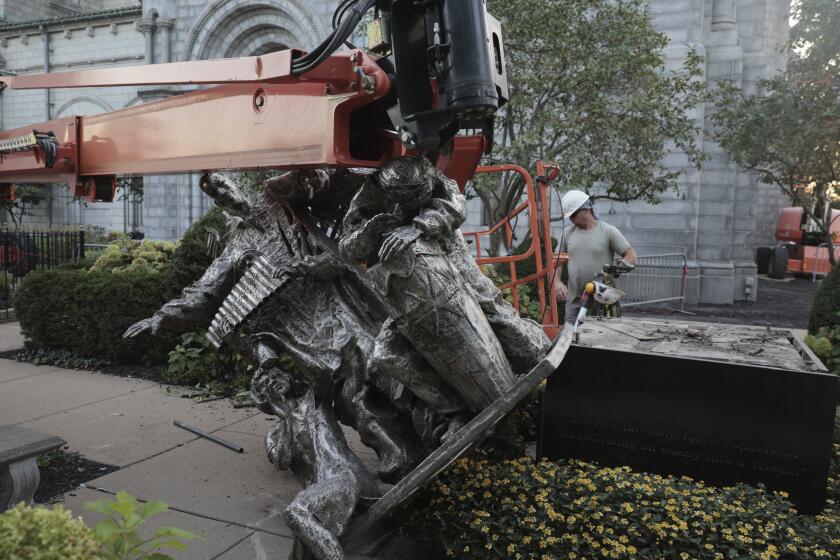Syria opposition has power struggles of its own
As Syrian opposition leaders threw punches at one another early this month in a five-star Cairo hotel, rebel fighters in Idlib province spent hours trying to fight off tanks, armored vehicles and attack helicopters with little more than Kalashnikov rifles.
By nightfall, as the rebels fled shelling that reportedly killed dozens, conference members continued to fight over post-revolution plans.
The conference scuffle laid bare power struggles among Syrians seeking the overthrow of President Bashar Assad, despite a conflict that has moved ever closer to the Syrian leader. On Wednesday, three of his senior military officials were killed in a bombing that struck at the center of the regime’s power.
But even as some rebel fighters say they are pushing for a “final battle” — and some reports said the Syrian leader had fled to the coastal city of Latakia — others say victory is far off, especially with the opposition still struggling to agree on exactly how to oust Assad and who should lead the way.
Perhaps most significant for the future of the uprising is the growing animosity between the exiled dissidents who have monopolized the narrative of the revolution internationally and the activists who have risked their lives to remain in Syria.
For months, opposition leaders who were at the forefront of the uprising when it began have been trying to parlay their activism into more prominent roles on the political front and in groups such as the Syrian National Council, the leading opposition bloc.
But even as they have led the early protest movements, helped form armed militias and become local leaders, they have been overshadowed by exiles in Egypt and Turkey who, many activists say, are out of touch with the revolution and country they claim to speak for.
“Everyone who says he represents us is a liar, and the proof of this is that they are not adopting the demands of the revolution,” Moaz Shami, an activist in Damascus, the Syrian capital, said via Skype. “They are all politicians trying to climb on our shoulders and on our goals.”
The schism between exiles and those who stayed behind is not uncommon: Witness the frictions in Iraq, Afghanistan and Libya. But in Syria, it has been further widened as the exiles remain abroad, unable to come back to the country.
In such a decentralized conflict, it is difficult to find a voice that represents any large swath of the country, not only raising questions about the success of the uprising but suggesting daunting prospects for any post-Assad transitional period.
The squabbling has other implications: Some point to the fighting at the Cairo conference, which saw the Kurdish delegation walk out, as an excuse for world leaders to delay further in backing the opposition, for fear that it still doesn’t represent a viable alternative to Assad.
***
The first time Ahmad Zidan, who uses a nom de guerre, sneaked out of Syria in late March, he was on his way to the Friends of Syria conference in Istanbul, Turkey.
He left his home in a village in the countryside of Idlib province and drove to a border town where thousands of refugees, injured fighters and army defectors have made their way out of the country and into the relative safety of Turkey.
After walking for more than an hour over the mountains that stand between the two countries, he went to a police station in Turkey, thinking he would be allowed to continue on his trip. Instead, Turkish officials took him with hundreds of others to a refugee camp.
Zidan explained that he was a member of the Syrian National Council, that he was a political leader in Idlib and that he was going to the conference. It didn’t mean anything to the soldiers.
He spent a day in the tent camp before activists helped spirit him out.
“There was no other way,” he said.
Now Zidan divides his time in and out of Syria — still following the same mountain smuggling route — as he juggles roles as a political leader and military leader and local activist. For all his travel, he is more than $10,000 in debt.
It’s a trade-off that he and other internal opposition members make: To gain recognition, they must travel outside the country to speak on behalf of their revolution, but the more time they spend abroad, the more their credibility at home is chipped away.
“Now we have a bigger role, now we understand the political game more and the world has a desire to deal with the activists,” said Zidan, who spoke on behalf of the revolutionary council in Idlib at the Cairo conference. “It doesn’t want to deal with the old political figures that have been outside the country for years.”
***
When it was founded in October, activists and world leaders had high hopes for the Syrian National Council, which was viewed as similar to the Transitional National Council in Libya that helped solidify support for those opposed to Moammar Kadafi.
Instead, the SNC has been roiled by jostling between different groups such as the Kurds or Muslim Brotherhood representing ideologies, sects and ethnicities.
For months, the internal groups representing the revolutionary movement struggled to unite in order to gain a louder voice in the opposition. Negotiations began and fell apart several times.
But as the situation in Syria worsened — and with daily death tolls regularly nearing 100 — there was a renewed push to try to take the lead in the opposition, especially in dealing with Arab and Western leaders.
In June, three of the main groups representing the revolutionary movements in the country formed the not very authoritative-sounding Joint Action Committee. The most prominent internal group, the Local Coordination Committees, decided not to join, but wasn’t specific about its reason.
“We should have done this a long time ago, but there is still an opportunity for this committee to present a solution for the council,” said Saleh Hamwi, a leader of the General Commission for the Syrian Revolution in the city of Hama. “The [Syrian] National Council does not express the demands of the revolution.”
Radwan Ziadeh, a Washington-based spokesman for the SNC and dissident who has become one of the prominent voices in the exiled opposition, was doubtful about the merit of the Joint Action Committee, but he also acknowledged that groups such as his didn’t do enough to support the revolution inside the country.
The exiles’ role has been mostly one of sending financial and humanitarian aid to the country, but they could have done much more to mobilize the international community and push for more decisive action, he said.
“The leaders in Washington or Cairo or Istanbul have failed to protect the civilians inside,” said Ziadeh, speaking from Brussels, where he was attending meetings. “That’s why the Free Syrian Army have become the heroes of the Syrian people.”
The SNC is undergoing a major restructuring, which grass-roots activists finally see as their opportunity to gain more seats and clout on the council. But many other factions are maneuvering for greater representation as well.
“The voice of the inside is being ignored while everyone is speaking on behalf of the revolutionaries,” said Shami, the Damascus activist. “He who wants to play politics should not be playing it at the cost of the Syrian people. In the end, it has to return to the will of the people on the ground.”
More to Read
Sign up for Essential California
The most important California stories and recommendations in your inbox every morning.
You may occasionally receive promotional content from the Los Angeles Times.










